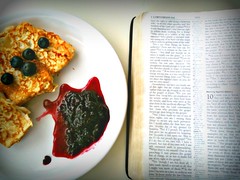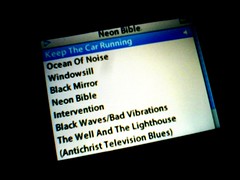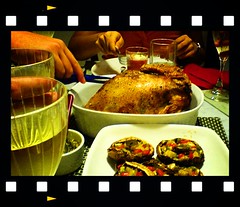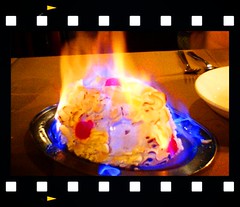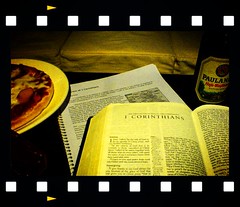Then they lay basking in the sun with the delight of those that have been wafted suddenly from bitter winter to a friendly clime, or of people that, after being long ill and bedridden, wake one day to find that they are unexpectedly well and the day is again full of promise. (Fellowship of the Rings, J. R. R. Tolkien)
A wet week of basking in the Singapore sun. For thanksgiving and archival purposes:
Friday: saying goodbye to BooksActually's up-the-rabbithole-at-the-whitehorsey treehouse on 125A Telok Ayer Street for the frontage of Ann Siang Hill. Kenny and Karen, still love the Birds & Co stuff (thanks strangeknight). Glad you liked the punch. We hope you draw regular salaries soon too!
Sunday: loads of catching up with people after service, then a good chat in the void deck under a block of HDB flats about differing interpretations of Romans 7, then a lazy afternoon of lunch, fellowship, sharing of burdens and being reminded from 1 Corinthians 15 of the reality and importance of Jesus' resurrection for the Christian faith;
Tuesday: being encouraged about the God with whom we can now have a direct relationship and whom we know hears our prayers because of the blood of his Son, at the home of a particularly greedy golden retriever. Every cracking open of a bag immediately precipitated the prick of furry ears, a streak of golden-yellow, a wet-nosed nuzzle and hot hopeful doggy breath by your side;

Later, in the midnight drizzle whilst leaning against a car, continued discussion about the authenticity of Christian communities, Book of Acts communities, the necessity of prayer and setting aside time for prayer, the probably non-physical acts of loving God intent on drawing back his recalcitrant people to right relationship with him. Back home, an early morning chat with a wayward actor in New York, who, having previously spoken of the utter loneliness of looking out at a neighbouring apartment full of people, framed by their sitting room windows, eating their TV dinners alone, of the difficulties of Green Cards, of not making rent every month, of caging money at church on Sundays, was finally deciding to head back where steady employment might actually materialise;

Friday: free tickets to Soil & "Pimp" Sessions at the Singapore Mosaic Festival where the death jazz was loud, frantic, insistent. Earplugs were handed out at the door. Inside the club-space, jumping about and sweating, afros all round, an agitator, a megaphone, strobe lights, a complimentary round of drinks and hands in the air.
(Thank you Heineken Music.) Then trying to wring out adjectives to describe the last 75 minutes of staged, very polite Japanese madness;



It would be difficult to truly acknowledge and revel in the innate goodness of friendship and mateship, of music and dancing, of drinking and eating, if they were all but trivial niceties, passing distractions to kill time while we wait for death.
That would be like the story told of a town that was known particularly for the jollity of its condemned criminals. These men would laugh and joke all the way to the gallows. This strange phenomenon drew many curious visitors from out of town and was very good for trade. But a sinister reason lay behind this. Every condemned prisoner would be visited by the town mayor and the mayor would tell him that actually, the gallows weren't going to be the end of them. Oh no, once the trapdoor opened beneath them, they would be caught by people stationed below, taken through an underground passage to a place out of town where a coach and four horses waited to take them to a place of safety. Now, the condition to all this that the prisoner must act jolly on his way to the gallows. Of course, the gallows were the end for these poor chaps. There wasn't anyone to catch them as they fell, there was no underground passage and there certainly wasn't a coach and four horses waiting for them anywhere.
Some people think that the Christian faith is like this, an elaborate hoax, a sort of Elisabeth Kübler-Ross acceptance of death covered liberally with Martha Stewart marzipan in Easter colours; that Christians fool themselves into thinking that there is a better place after this life, that there is a God who cares enough about the world to pronounce judgement on evil and to save those who trust in him from judgement, that there is meaning to this life and the sensual pleasures offered by this world.
Paul was well aware of the possibility of delusion. Christians say that death is not the end. But what if it was?
...if there is no resurrection of the dead, then not even Christ has been raised. And if Christ has not been raised, then our preaching is in vain and your faith is in vain. We are even found to be misrepresenting God, because we testified about God that he raised Christ, whom he did not raise if it is true that the dead are not raised. For if the dead are not raised, not even Christ has been raised. And if Christ has not been raised, your faith is futile and you are still in your sins. Then those also who have fallen asleep in Christ have perished. If in Christ we have hope in this life only, we are of all people most to be pitied. (1 Corinthians 15:13-19)
But this little thought experiment in futility is moot, because Christ was in fact raised from the dead (15:20). Jesus did really die (15:3), he was buried (15:4) and was raised again on the third day (15:4). There were many eyewitnesses of this: Simon Peter (15:5; Luke 24:34), the 12 disciples (15:5; Mark 16:14; Luke 24:36; John 20:19, 26; Acts 10:41), and, if one found numbers convincing, over 500 people at one time (15:6) - some of whom were still alive and could verify the event, and then to James and the apostles (15:7; Luke 24:50; Acts 1:3, 4), and then also to Paul himself (15:8). (William Lane Craig has a quick walk through the evidence for resurrection here.)
Jesus' death wasn't an accident. There wasn't a flurry in heaven when he died on the cross. It had been planned from eternity and had been written about in various parts of the Scriptures (15:3-4) hundreds of years before he was incarnated on earth.
Jesus' death was purposeful. God intended that Jesus should die in place of all sinners (that is, all of us) so that those who trust in him will no longer face eternal death.
...Christ has been raised from the dead, the firstfruits of those who have fallen asleep. For as by a man came death, by a man has come also the resurrection of the dead. For as in Adam all die, so also in Christ shall all be made alive. But each in his own order: Christ the firstfruits, then at his coming those who belong to Christ. Then comes the end, when he delivers the kingdom to God the Father after destroying every rule and every authority and power. For he must reign until he has put all his enemies under his feet. The last enemy to be destroyed is death. (1 Corinthians 15:20-26)
Which, Potterheads, is a far more glorious reality than Harry finally understanding the words on his parents' grave before deciding to face Voldemort in that penultimate The Deathly Hallows showdown.
BooksActually
5 Ann Siang Road from 17 March 2008
Monster Mash
26 Lorong Mambong
Holland Village
Singapore 277685
Labels: 1 Corinthians, All Given For Food: Bake and Cake, Friendship and mateship, Resurrection, Thanksgiving

